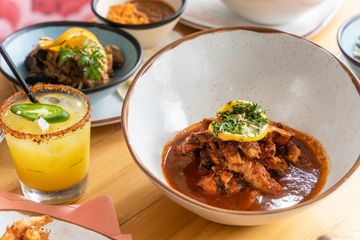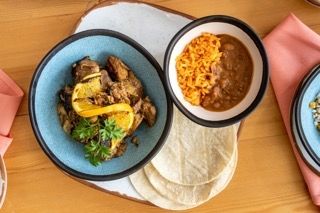Is Mexican Food Healthy And Balanced? Unboxing the Nutritional Advantages of Conventional Active Ingredients
The question of whether Mexican food is healthy and balanced invites an expedition of its standard active ingredients. Beans and corn act as fundamental staples, abundant in healthy protein and fiber. Avocados supply valuable fats, while numerous herbs and spices add taste and wellness advantages - happy hour. With each other, these components produce a tapestry of nutrition. The healthiness of Mexican cuisine usually depends on preparation approaches and portion sizes. What function do these variables play in identifying its total nutritional value?
The Power of Beans: Protein and Fiber-Rich Staples
Frequently forgotten, beans offer as a foundation of Mexican cuisine, using a wealth of nutritional benefits. Rich in healthy protein, they are an excellent plant-based choice for those seeking to satisfy their dietary protein requires. This high protein content sustains muscle mass repair work and growth, making beans very useful for both vegetarians and meat-eaters alike. Furthermore, beans are an exceptional source of dietary fiber, which aids in digestion and promotes a feeling of volume, possibly aiding with weight monitoring.
The selection of beans made use of in Mexican dishes, such as black beans, pinto beans, and kidney beans, contributes to a diverse flavor profile and can enhance meals nutritionally. Beans are low in fat and include crucial vitamins and minerals, consisting of magnesium, iron, and folate. With each other, these qualities make beans a vital component, providing both nourishment and nourishment in standard Mexican price.

Corn: a Versatile Grain With Nutritional Conveniences
Corn stands apart as a functional grain essential to Mexican food, celebrated not only for its culinary applications yet additionally for its excellent nutritional account. As a main active ingredient in dishes like tortillas, tamales, and pozole, corn gives vital nutrients that add to a balanced diet plan. Rich in carbs, it serves as a considerable energy resource, while additionally being low in fat, making it a positive option for various nutritional demands.
Corn is a good source of nutritional fiber, which helps in digestion and promotes satiation. It contains considerable amounts of vitamins such as B-complex vitamins, which are necessary for energy metabolic rate. The visibility of anti-oxidants, specifically carotenoids, adds to general health by lowering oxidative anxiety. Additionally, corn is gluten-free, satisfying those with gluten level of sensitivities. In general, the nutritional benefits of corn underscore its significance in conventional Mexican food and its duty in a healthy and balanced diet plan.
Avocados: Healthy And Balanced Fats and Nutrients in Every Bite
Avocados play a significant role in Mexican cuisine, complementing dishes with their creamy texture and abundant taste. Past their culinary charm, avocados are celebrated for their excellent dietary account. They are an abundant resource of healthy and balanced monounsaturated fats, which can assist lower poor cholesterol levels and assistance heart wellness. In addition, avocados are loaded with necessary nutrients, consisting of potassium, vitamin E, and B vitamins, adding to overall wellness.
The high fiber web content in avocados help digestion and promotes satiety, making them a helpful enhancement to any type of dish. Their one-of-a-kind nutrient structure can likewise sustain skin wellness and give anti-inflammatory advantages. Integrating avocados right into typical Mexican dishes or enjoying them as a standalone treat can boost both taste and nutrition, showing why they are a precious staple in Mexican cuisine. Overall, avocados offer a scrumptious method to delight in healthy fats and essential nutrients in every bite.

Herbs and spices: Flavorful Wellness Boosters
While delighting in the abundant tastes of Mexican cuisine, one can not forget the necessary role that spices and natural herbs play in boosting both taste and wellness. Components such as cilantro, oregano, and chili peppers not just add to the vivid flavor profile yet additionally provide substantial health benefits. For circumstances, cilantro is recognized for its cleansing residential properties, helping to get rid of hefty steels from the body, while oregano is loaded with anti-oxidants and possesses anti-inflammatory results.
Chili peppers, a staple in several Mexican recipes, contain capsaicin, which has been linked to enhanced metabolic process and pain relief. Furthermore, flavors like cumin and coriander assistance food click to find out more digestion and might assist in blood sugar level law. Including these savory wellness boosters into dishes not just improves the culinary experience but also advertises total wellness, making Mexican cuisine not just delicious, but additionally nutritionally beneficial.
Standard Cooking Methods: Enhancing Nutrition and Taste
Standard cooking methods in Mexican cuisine play a crucial duty in boosting both nourishment and taste, as they often focus on fresh ingredients and classic techniques. Strategies such as nixtamalization, where corn is soaked and cooked in an alkaline remedy, not just enhance the additional reading nutrient profile of tortillas yet additionally boost their digestibility - churros. In addition, using slow-moving cooking methods, like cooking or braising, allows tastes to combine beautifully while maintaining the integrity of the active ingredients

Often Asked Concerns
Are Mexican Food Portions Usually Larger Than Other Cuisines?
Mexican food portions are often larger than those of several other foods. This particular shows conventional eating techniques, stressing common sharing and hearty meals, which can result in a more substantial serving size in general.
How Does the Prep Work Approach Affect Healthfulness of Mexican Food?
Preparation methods substantially influence the healthfulness of Mexican food. Techniques useful site such as cooking or steaming protect nutrients, while frying can enhance undesirable fat material. Choices of active ingredients and cooking designs inevitably determine overall nutritional value.
Can Mexican Food Be Tailored for Particular Nutritional Constraints?
Mexican food can undoubtedly be tailored for details nutritional constraints. Alternatives, such as making use of corn tortillas for gluten-free diet plans or incorporating even more vegetables, enable people to appreciate typical tastes while accommodating numerous nutritional needs.
What Are Common False Impressions Concerning Mexican Food and Health?
Common misunderstandings about Mexican food consist of the belief that it is naturally unhealthy, overly zesty, and only concentrated on fats. In fact, standard dishes often feature nourishing ingredients and can be customized to different nutritional needs.
Exist Healthier Options at Mexican Dining Establishments?
Healthier choices at Mexican dining establishments usually include grilled meats, beans, and fresh vegetables. Choosing recipes that highlight entire components and staying clear of heavy sauces can bring about a more nourishing eating experience, advertising general health.
The variety of beans used in Mexican meals, such as black beans, pinto beans, and kidney beans, adds to a varied flavor profile and can improve dishes nutritionally. Avocados play a significant function in Mexican food, matching meals with their velvety texture and rich flavor. Incorporating avocados right into standard Mexican meals or appreciating them as a standalone treat can boost both taste and nourishment, showing why they are a cherished staple in Mexican cuisine. While taking pleasure in the abundant flavors of Mexican cuisine, one can not neglect the essential role that spices and herbs play in improving both taste and health and wellness. Standard food preparation techniques in Mexican food play a vital function in enhancing both nourishment and taste, as they often focus on fresh components and time-honored strategies.